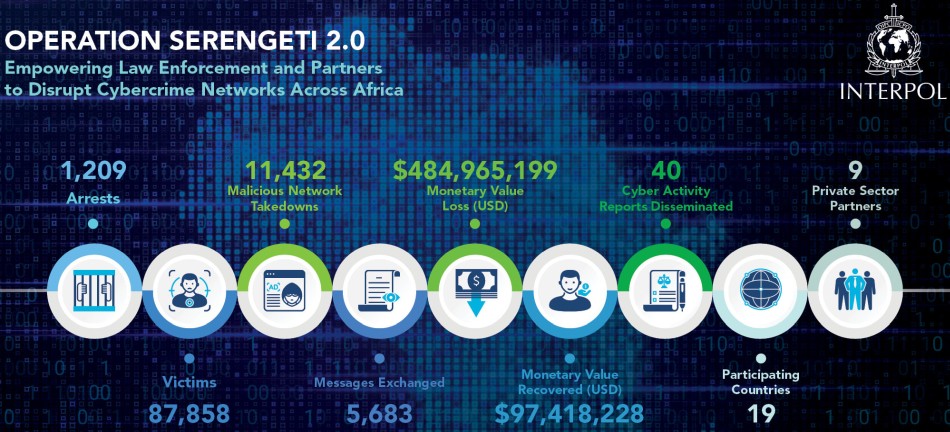
A sweeping INTERPOL-led operation across Africa has resulted in the arrest of 1,209 individuals tied to high-impact cybercrime networks, the dismantling of over 11,000 malicious infrastructures, and the recovery of nearly $100 million in stolen funds.
The multi-month effort, codenamed Operation Serengeti 2.0, was carried out between June and August 2025 and coordinated investigators from 18 African countries along with the United Kingdom. This operation, part of the broader African Joint Operation Against Cybercrime initiative, focused on some of the continent's most pressing digital threats, including ransomware attacks, business email compromise (BEC), and online investment fraud.
The operation was made possible through a collaborative intelligence-sharing effort involving public agencies and private cybersecurity firms. Partners such as Kaspersky, Fortinet, Group-IB, and Trend Micro provided technical expertise, actionable threat intelligence, and training to enhance investigative capabilities.

INTERPOL
Among the most significant takedowns was in Zambia, where authorities dismantled a large-scale investment fraud ring targeting cryptocurrency investors. This operation alone uncovered over 65,000 victims globally who were deceived into downloading fake apps and making high-yield crypto investments, resulting in estimated losses of $300 million. Zambian police arrested 15 suspects and seized digital evidence, including control domains, SIM cards, and bank accounts. In a parallel effort, Zambian officials intercepted a human trafficking operation, seizing 372 forged passports originating from seven different countries.
Meanwhile, in Angola, authorities shut down 25 illegal cryptocurrency mining operations, all operated by 60 Chinese nationals who were exploiting the local power grid to mine crypto at scale. Alongside the arrests, 45 illicit power stations were seized, and hardware worth more than $37 million was confiscated. The Angolan government has announced plans to repurpose the reclaimed power infrastructure to benefit underserved communities.
In Côte d'Ivoire, investigators targeted an elaborate inheritance scam with roots in Germany. The scheme convinced victims to pay processing fees to unlock non-existent inheritances, a tactic that remains surprisingly lucrative despite its age. The operation resulted in the arrest of the primary suspect and the seizure of assets, including vehicles, electronics, cash, and forged documents. Losses from the scam are estimated at $1.6 million.
INTERPOL Secretary General Valdecy Urquiza emphasized that the operation demonstrates the growing capability and impact of global cybercrime enforcement, noting that every coordinated action builds on the last by fostering cross-border collaboration, increasing intelligence flows, and sharpening technical skills. The operation was also bolstered by InterCOP, a preventive initiative led by the Netherlands, and involving 36 countries, that focuses on early identification and mitigation of emerging cybercriminal activity.







Leave a Reply